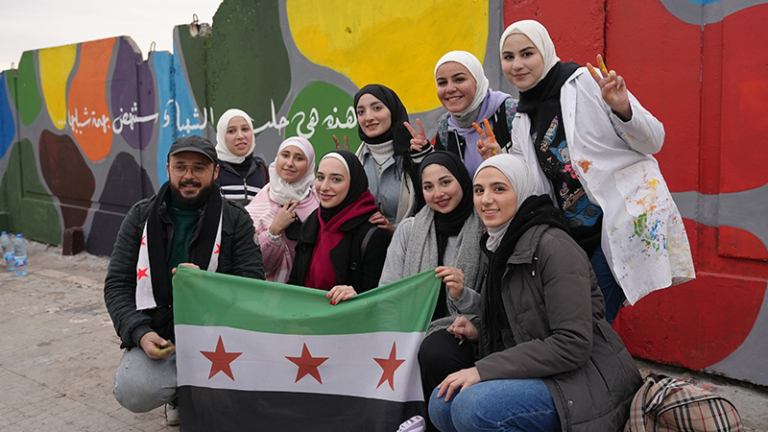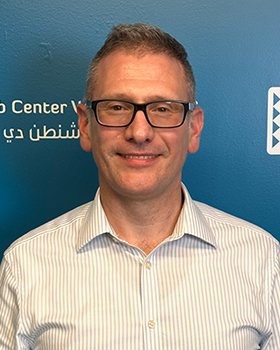
The Arab Opinion Index: Syrian Public Opinion Survey 2025 provides an unusually granular view of political attitudes in a country long considered impervious to empirical survey research. With nearly 3,700 respondents, this survey is the broadest attempt to capture Syrian public opinion since the uprising of 2011. The timing is crucial. Conducted in July-August 2025, just months after the fall of Bashar al-Assad in December 2024, the results capture both the lingering euphoria of regime collapse and the constraints that limit Syrians’ hopes for a political transition that is still fragile and uncertain.
Perhaps the most striking finding is the extent of popular optimism reported in the survey. Fifty-six percent of respondents believe that Syria is moving in the right direction, and majorities describe emotions of relief, safety, happiness, and hope. These figures act as a litmus test for the country’s political mood—respondents were optimistic despite worries about Syria’s potential partition, external intervention, and Israeli airstrikes and ground incursions into Syrian territory. Economic difficulties are widespread: 42 percent of respondents say that they cannot make basic household needs, 36 percent rely on remittances, and 61 percent do not eat meat every week. The juxtaposition of hope alongside hardship is reminiscent of other post-war transitions in the region—foremost among them Iraq in 2003—where initial moments of celebration were rapidly overtaken by the disappointments of authoritarian governance.
A narrow majority of respondents express confidence in state institutions, notably those responsible for public order (57 percent), the government (55 percent), and the ministry of defense (54 percent). In comparative terms, these figures are respectable—a May 2025 Bentley-Gallup poll found that only 31 percent of Americans trusted the federal government to act in society’s best interests, for example. Syrians express a remarkably high degree of confidence in government considering the evisceration of state institutions during the civil war. But the numbers indicate a narrow consensus that could prove fleeting without economic and political improvements.
Corruption is still a major grievance. Nearly 90 percent say it is widespread, though 56 percent report that it has decreased since the fall of the Assad regime. Transitional justice is another telling indicator: two-thirds want accountability extended to all perpetrators of crimes during the civil war, whether Assad loyalists or opposition forces. This demand for general accountability rather than victor’s justice should send a clear message to Syria’s current government as it measures its responses to the April 2025 massacres on the coast and the July 2025 violence in al-Suwayda, as pro-government forces were implicated in both events.
Support for democracy emerges as a strong normative commitment from the survey results. Sixty-one percent say that democracy is the best system of government, despite its flaws; 73 percent support competitive elections of one form or another. Syrians are not revisiting old debates whether democracy is compatible with Islam; the majority simply assume that it is. Fifty-three percent of Syrians say that they would accept the election of a political party with which they disagreed if it received the most votes freely and fairly. Although Syrians express a clear commitment to democracy, those principles will no doubt be tested in the future by the realities of electoral politics. In December 2023, after all, 36 percent of Americans believed Joe Biden’s 2020 election was illegitimate.
Respondents expressed support for a diverse range of political tendencies in Syria, from broad Syrian nationalism (62 percent) and Islamism (54 percent) to Arab nationalism (48 percent), secularism (38 percent), liberalism (37 percent), and socialism (24 percent). Deriving voting intentions from these numbers is difficult, not least because in January 2025 the new Syrian authorities dissolved all existing political parties and have yet to pass legislation permitting the creation of new ones. In the absence of political parties, Syria’s September 2025 elections are underway as indirect, closed shops. Local community leaders have formed electoral colleges to co-opt representatives to fill 140 of 210 seats in parliament; interim President Ahmad al-Sharaa will appoint the remaining 70 seats. The new authorities may be correct that a flawed but at least functioning parliament is preferable to a democratically elected parliament for which organizing a free and fair popular vote could take years. But Syrians will surely remember the long-frustrated demands for a new political parties law raised in the 2000-2001 Damascus Spring. Former President Bashar al-Assad delayed implementing the law until July 2011—by which time the popular uprising was well underway. In June 2025, the head of Syria’s Higher Election Committee, Mohammed Taha al-Ahmad, reportedly said that he wanted “a parliament that is homogeneous with the authorities.” While service provision and a functioning economy are essential preconditions for stability, political participation by Syrians across the full spectrum of public opinion—including critics of the transitional authorities—should not be seen as an unnecessary luxury.
Finally, the survey also sheds light on familiar tensions in understandings of what it means to be Syrian. Respondents identified a shared Syrian culture (19 percent), common Arabic language (17 percent), living in Syria (10 percent), and social and cultural diversity (9 percent) as the most important factor in shaping national identity. Sixty-six percent of Syrians said sect and religion did not influence their social relationships, though 85 percent of respondents reported that “sectarian rhetoric” was widespread, and 84 percent believed that Syrians today identify themselves and others based on sectarian and religious affiliation. These findings echo the phenomenon of the ‘bias blind spot,’ well known to pollsters of US public opinion, whereby unfeasibly large numbers of people report themselves to be less biased than the average respondent. Nevertheless, Syrians express no support for the idea of political power-sharing along ethnic or sectarian lines, despite the popularity of this idea among policymakers in such countries as Israel.
In sum, the Syrian Public Opinion Survey 2025 reveals a society in flux: buoyed by optimism after Assad’s fall, yet hemmed in by corruption, economic precarity, and an unresolved political process. Syrians affirm democracy, demand accountability, and reject authoritarian excuses. But these aspirations are set against weak institutions and limited state capacity.
Two points stand out from the findings. First, optimism should not be mistaken for the consolidation of Syria’s new political order. Without tangible improvements in living standards and political inclusion, disillusion could quickly return. Second, Syrian attitudes remind us that publics are not passive consumers of political decisions by those who hold power. Ordinary people are capable of expressing their own visions of democracy, accountability, and solidarity. Presidents and policymakers ignore these visions at their peril.
The views expressed in this publication are the authors’ own and do not necessarily reflect the position of Arab Center Washington DC, its staff, or its Board of Directors.
Featured image credit: Shutterstock/Mohammad Bash

